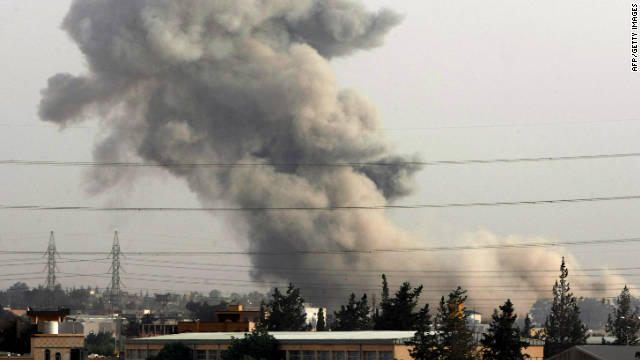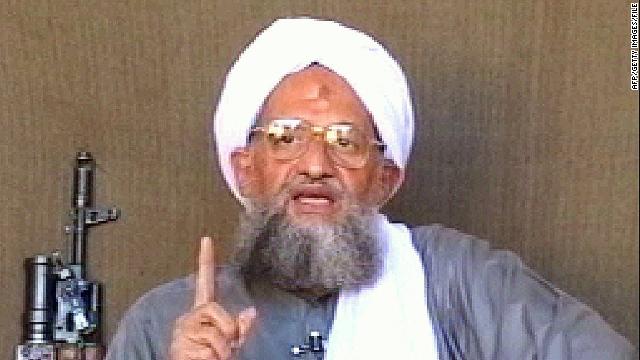NATO failed to investigate airstrike casualties in Libya
 (CNN)
-- A leading human rights organization accused NATO on Monday of
failing to investigate civilian deaths caused by its air strikes in
Libya that aided in the downfall of Moammar Gadhafi.
(CNN)
-- A leading human rights organization accused NATO on Monday of
failing to investigate civilian deaths caused by its air strikes in
Libya that aided in the downfall of Moammar Gadhafi.In a 20-page report titled "Libya: The Forgotten Victims of NATO Strikes," Amnesty International laid out allegations that NATO and the new Libyan government failed not only to document the deaths but has not paid reparations to the victims and their families.
The report said "scores of Libyan civilians who did not directly participate in hostilities were killed and many more injured as a result of NATO strikes," adding that the 28-member nation alliance has yet to address the incidents in the months since it ended the air campaign.
NATO did not immediately respond to a CNN request for comment, though it apparently defended its actions in a letter to Amnesty International.
"While NATO did everything possible to minimize the risk to civilians, in a complex military operation that risk cannot be reduced to zero," NATO said in response to an inquiry by the rights group, according to the report. Read More
Why Syria Won't Get the Libya Treatment from the West
 One
year ago, on March 19, 2011, Western leaders, alarmed by the disaster
unfolding in Libya, voted in the U.N. Security Council to intervene
militarily with "all necessary means," arguing that they could not stand
by and watch civilians get massacred.
One
year ago, on March 19, 2011, Western leaders, alarmed by the disaster
unfolding in Libya, voted in the U.N. Security Council to intervene
militarily with "all necessary means," arguing that they could not stand
by and watch civilians get massacred. As a result of the U.N. resolution, NATO launched a bombing campaign, led by Britain, France and the U.S., and flew about 10,000 bombing sorties over Libya, helping to obliterate Muammar Gaddafi's 42-year dictatorship in just seven months.
So, could it happen in Syria? Probably not, according to two reports out on Monday. Both suggest that the Western powers would face significantly bigger challenges in intervening against President Bashar Assad, both politically and militarily, than they did in Libya. Says the British military think tank Royal United Services Institute for Defence and Security Studies (RUSI) in a report marking the anniversary of the U.N. vote: "The Libya intervention took place in a singularly unique moment where the international stars, as it were, were aligned in a set of propitious circumstances."
Unlike Gaddafi, Assad has hugely upgraded his air- and sea-attack capabilities since the revolt against him erupted a year ago, according to the Stockholm International Peace Research Institute (SIPRI), which tracks the opaque defense industry. In its yearly report on global arms transfers, also to be published on Monday, SIPRI lists billions spent by Assad on state-of-the-art Russian systems, much of which has been delivered during the past year. "This is a major upgrade," says Paul Holtom, SIPRI senior researcher on arms transfers. "Any discussions about an air attack on Syria would be more challenging than it would have been previously." Read More
Al Qaeda leader's brother to be freed in Egypt
 Cairo
(CNN) -- Mohamed al-Zawahiri, brother of al Qaeda leader Ayman
al-Zawahiri, will be freed from prison in Egypt after 13 years, his
attorney said Monday.
Cairo
(CNN) -- Mohamed al-Zawahiri, brother of al Qaeda leader Ayman
al-Zawahiri, will be freed from prison in Egypt after 13 years, his
attorney said Monday.He was acquitted by an Egyptian military court and will be released Tuesday, said attorney Nizar Ghorab.
Mohamed al-Zawahiri was imprisoned in 1999 after being detained and extradited from the United Arab Emirates on allegations that he was linked to the 1981 assassination of Egyptian President Anwar Sadat. Al-Zawahiri was acquitted on the assassination charges but later was accused of conspiring against the Egyptian government.
He was sentenced to death, but then appealed the ruling.
Last year, Egypt's interim government released him along with scores of other political prisoners after a general pardon was issued by the Supreme Council of the Armed Forces, which ruled the country after the ouster of President Hosni Mubarak. But al-Zawahiri was arrested again shortly after. Read More
Red Cross Asks Russia For Help On Syria Aid
 The
International Committee of the Red Cross (ICRC) has said it has been
given "positive indications" from Russia that it will help them secure
more access for humanitarian aid for Syrian civilians.
The
International Committee of the Red Cross (ICRC) has said it has been
given "positive indications" from Russia that it will help them secure
more access for humanitarian aid for Syrian civilians.ICRC President Jakob Kellenberger met Russia's Foreign Minister Sergey Lavrov in Moscow on Monday.
ICRC spokeswoman Carla Haddad Mardini said the organisation "received positive indications of support on its operational priorities and on its initiative of a two-hour cessation in fighting on a daily basis".
The Red Cross has yet to receive permission from Syria to access all parts of the country affected by fighting. Damascus has also yet to agree to a daily two-hour cease-fire requested by the group.
Russia is one of President Bashar al Assad's few remaining allies and is seen as retaining some leverage on the Damascus government.
Earlier, heavy machine-gun fire and rocket-propelled grenades have been heard in Damascus as fighting broke out in a district where a number of security buildings are located, witnesses say.
Residents said the two-hour battle, apparently between security forces loyal to President Assad and opposition fighters, was intense. Read More
Secret files reveal 9,000 Nazi war criminals fled to South America after WWII
 Nine thousand Nazi war criminals fled to South America after the Second World War, it has been revealed for the first time.
Nine thousand Nazi war criminals fled to South America after the Second World War, it has been revealed for the first time.After receiving tip-offs, German prosecutors were recently granted access to secret files in Brazil and Chile that confirmed the true number of Third Reich immigrants.
According to the documents, an estimated 9,000 war criminals escaped to South America, including Croatians, Ukrainians, Russians and other western Europeans who aided the Nazi murder machine.
Most, perhaps as many as 5,000, went to Argentina; between 1,500 and 2,000 are thought to have made it to Brazil; around 500 to 1,000 to Chile; and the rest to Paraguay and Uruguay.
These numbers do not include several hundred more who fled to the safety of right-wing regimes in the Middle East.
Previous estimates as to how many Nazis fled to South America have varied wildly from 5,000 to 300,000. Read More
Defiant North Korea says rocket launch to go ahead
Political analysts say the launch, which would violate U.N. resolutions on the heavily sanctioned state, is aimed at boosting the legitimacy of its young new ruler Kim Jong-un who inherited power after his father's death in December.
"The peaceful development and use of space is a universally recognized legitimate right of a sovereign state," the North's state KCNA news agency said.
North Korea says it is using the rocket to launch a satellite to mark the 100th anniversary of the birth of Kim Il-sung, the country's founding ruler and grandfather of the current ruler.
The United States, and others, say it is much the same as a ballistic missile test and therefore off-limits for the isolated state which has for years been trying to build a nuclear arsenal.
Washington, which last month agreed to supply North Korea with food in exchange for a suspension of nuclear tests, missile launches and uranium enrichment and to allow nuclear inspectors into the country, called the planned launch "highly provocative". more


No comments:
Post a Comment